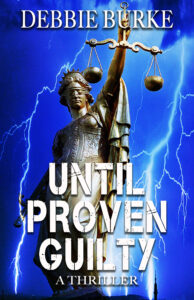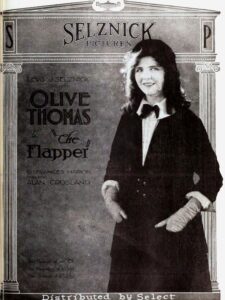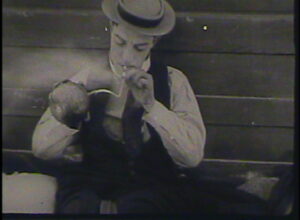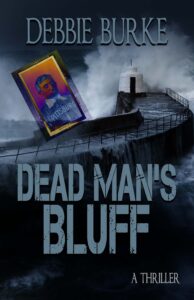by Debbie Burke
![]()

Today, welcome to another Brave Author who’s submitted a first page for critique. The genre is noir fiction. Please take a look then we’ll discuss.
~~~
An Easy Fix
You always think you know what you’re doing, but that’s just the first circle of hell. Well. Maybe not the first circle but the escalator only goes one way and that’s down. Oh, you can try and run up but you’ll never make it. You’ll run out of breath, you’ll sweat and wheeze and pant and then you’ll collapse like a bag of dirty laundry.
The bartender came over to Elam’s end of the bar from where she’d been cleaning glasses. She wiped her hands on a towel.
“What’ll it be, Elam?”
“A double of Jack and a draft Bud, Katie.”
The bartender placed two coasters on the bar, poured the draft and two shots, and set them in front of Elam. He placed a crumpled twenty on the bar.
“What have you been up to, Elam? How’s Charity?”
“Exceptional children, they call ‘em. Whoever thought that up needs to be smashed in the face. I mean, what are they trying to do here? Make people feel good about disasters? The only reason Charity was exceptional was the fucking doctors with their knives and their halothane masks.”
“Really? I thought you were over the worst of it.”
“You know what a bum mitral valve is, Katie? She’d run out of breath and turn blue, couldn’t keep up with the kids on the playground. So they say, ‘Oh yeah. An easy fix. Be back home in five days.’ And then the fucking anesthesiologist is thinking about her cheating husband, and her girlfriend and his girlfriend and their trip to Aruba and her mind’s a million miles away and she’s not paying attention because it’s all so routine. An easy fix. And the pressure drops and the cock sucker is fucking with the regulators in a panic but it’s too goddamned late. There’s no going back.”
“I didn’t know. You never talked about it.”
“Now the kid’s in a wheelchair and can’t see and can’t walk and she goes to a special school for kids like her. She’s a tape recorder, everything that she hears she repeats.”
That’s how Elam knew about Carol’s boyfriend, from Charity.
A year after Charity came home Carol left. It was anticlimactic. No big showdown like the OK Corral. Elam came home from driving the beer truck and Carol was gone, took nothing except a suitcase and her Ford Fairlane. She did clean out the bank account and set the credit cards on fire at ATMs across Missouri and Kansas.
Elam never heard from Carol again. He’d hear things every now and again when his mother in law would let something slip, something about her boyfriend and Las Cruces, but that was all.
He didn’t care any more.
~~~
Title: An Easy Fix offers the right blend of noir and irony, promising the story will be anything but an easy fix.
First Paragraph: Trying to run up an escalator that’s going down is great imagery of never-ending frustration and despair.
But combining that image with the first circle of hell feels like mixing metaphors.
The point of view is uncertain. Is it omniscient or Elam’s? Is Elam addressing the reader? Or musing to himself?
A bag of dirty laundry doesn’t really collapse because that implies it was previously upright. Choose a different verb.
This first paragraph shows promise but needs a little honing.
Premise: Elam’s situation is tragic and compelling. He’s the father of a child who was permanently damaged by medical carelessness. His marriage has fallen apart. He’s tired of trying to run up the descending escalator of his life. He wants to give up.
The last line is: “He didn’t care any more.”
That line sums up what I see as the biggest problem with this page: If the main character doesn’t care, why should the reader?
How do you make the reader care?
Make something happen.
But…the next paragraphs don’t advance the story. The setting and actions are ordinary and generic—wiping glasses, ordering a drink, putting down coasters, paying, small talk.
That’s followed by an info dump of backstory about Elam’s daughter. Medical terms like mitral valve and halothane masks add authenticity. But there’s too much for one passage, especially on page 1.
Then comes another info dump about his failed marriage. At this point, do readers need to know all these details? Or can they be saved for later?
This first page describes a typical day in Elam’s dreary life as he unburdens himself to a bartender. That’s not enough momentum to compel the reader to turn the page. It needs a stronger sense that something dire is about to happen.
Disturbance: What is different about this day? What changes Elam’s course?
Charity provides an excellent opportunity to make the reader care and also pump up the forward momentum of the story: “She’s a tape recorder, everything that she hears she repeats.”
That line is loaded with possibilities. What did Charity say on this particular day to disrupt Elam’s life?
The scene in the bar could be reworked like this:
Before Elam had time to settle on his regular stool, Katie slid a beer and two shots across the bar to him and asked, “How’s your daughter?”
He slugged down half the brew. “You won’t believe what Charity said today…”
Then reveal the problem.
Another place to open the story might be when Elam comes home from work and Charity delivers a startling message. For instance:
“Your electricity will be shut off tomorrow for non-payment.”
Or Charity quotes her caregiver: “Tell your dad I quit. I’m sick of cleaning up after a brain-dead little brat who shits herself and parrots every effing word I say.”
Or Charity repeats a voicemail from Elam’s lawyer: “The judge dismissed your malpractice suit for lack of evidence. Sorry, there’s nothing more I can do.”
The words Charity hears and repeats force Elam to take action. Backstory can then be added in small bits while the action moves forward.
Action Options: What are Elam’s choices? He could surrender his daughter to an institution, commit suicide, or storm the hospital to take revenge. Or the Brave Author has entirely different plans in mind.
I’m guessing, in the next few pages, Elam makes his decision. Try moving that decision to page 1.
Another alternative: Keep the bar setting but make the big change occur there. Katie feels sorry for Elam’s financial troubles. She heard about an upcoming heist and the gang needs a driver. Since Elam drives a beer truck and knows how to handle a big rig, he’s the perfect guy. Then she hands him a phone number.
Character: There is no physical description of Elam and Katie. All character development is done through dialogue (more on that in a minute). I’m not suggesting driver’s license details like hair and eye color but give the reader a few hints such as…
When Elam sits on the barstool, he realizes he’s slumping and thinks, at 40, he probably looks as old and broken down as his dad who died at 65.
Weave in their attitudes and personality. Elam can notice sympathy in Katie’s eyes. That irritates him because he doesn’t want to be pitied.
Add interior monologue, such as: People always think they understand but they don’t. They don’t know what’s it’s like to change stinking diapers or get her wheelchair trapped in a narrow doorway.
Dialogue: Elam’s cursing shows his frustration and bitterness but it quickly becomes repetitive. Save F-bombs and C-bombs for significant moments. Otherwise, they lose their impact.
Try interspersing gestures, facial expressions, and Elam’s thoughts with the dialogue so what he says sounds less like a speech and more like a conversation.
Time stamp: Ford Fairlanes were manufactured between 1955-1970. Readers who aren’t gearheads probably don’t know that. But it’s a subtle, economical way to hint at the era.
Summing Up: Brave Author, the premise has excellent potential but I feel the story starts in the wrong place. As you reread your draft, look for the passage where a change occurs in Elam’s situation. As mentioned above, it may be on page 2 or 3 or later. Try beginning the story at that point.
Make something happen. Elam may not care but readers must care or they won’t turn the page.
Thanks for submitting and best of luck!
~~~
TKZers: Does the Brave Author’s premise grip you? What do you think of Elam? Any suggestions?
~~~

When the law prevents justice…
When DNA isn’t enough…
When a lie is the truth.
Please check out my new thriller, Until Proven Guilty.





